
Colon cancer, also known as colorectal cancer, is one of the most common cancers worldwide. It starts in the colon or rectum, which are parts of the large intestine in the digestive system.
Like many cancers, colon cancer often begins quietly, without clear signs at first. But catching it early can make a big difference in treatment success and survival.
Many people don’t notice any symptoms during the early stages of colon cancer, which is why regular screening is so important, especially for people over 45 or those with a family history. However, some early warning signs do exist, and it’s helpful to know what to watch for.
One common early sign is a change in bowel habits that lasts more than a few days. This might include diarrhea, constipation, or feeling that your bowel doesn’t empty completely. While these symptoms are common and often caused by other conditions like stress or diet changes, they should be checked out if they persist.
Another warning sign is blood in the stool. This can appear bright red or dark, making the stool look almost black. Sometimes the blood is not visible to the naked eye but can be found through tests. Bleeding in the digestive system is a serious symptom and should not be ignored.
Unexplained weight loss can also be an early clue. If you are losing weight without trying, and especially if you also have other digestive symptoms, it could be a sign that something more serious is going on. Cancer can affect the way your body absorbs nutrients or increase the amount of energy it uses.
Feeling tired all the time is another possible symptom. Colon cancer can lead to slow, long-term blood loss in the stool, which may cause anemia—a condition where you don’t have enough red blood cells. This can make you feel weak, dizzy, or short of breath.
Some people also experience stomach pain, cramps, or bloating. These symptoms may come and go or get worse over time. If you have a feeling of fullness in the belly, even after a light meal, it may be worth discussing with a doctor.
Scientific research supports the importance of these signs. A study in the journal BMJ Open found that patients with early-stage colon cancer often experienced symptoms like rectal bleeding and changes in bowel habits months before diagnosis.
Another study in *Cancer Epidemiology* showed that many people delayed seeing a doctor for these symptoms, which led to later-stage diagnoses.
The good news is that colon cancer is one of the most preventable and treatable cancers if caught early. Regular screening tests—such as stool tests, colonoscopies, or flexible sigmoidoscopies—can find polyps (small growths) before they turn into cancer. Removing these polyps can stop cancer before it starts.
If you or someone you know experiences any of these early signs, don’t wait to talk to a healthcare provider. It may turn out to be something minor—but catching colon cancer early could save your life.
If you care about cancer, please read studies about common drugs for inflammation may help kill cancer, and statin drugs can starve cancer cells to death.
For more information about cancer, please see recent studies about these two things are key to surviving cancer and results showing common Indian fruit may slow down cancer growth.
Copyright © 2025 Knowridge Science Report. All rights reserved.



